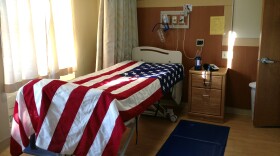-
Citing reports by NPR and Colorado Public Radio, 12 senators want the Army to investigate the discharges of tens of thousands of troops with mental health disorders.
-
When Marine Cpl. Zach Stiles returned from Iraq, he couldn't sleep, hold down a job or pay rent. He and his father sat down with StoryCorps to talk, for the first time, about his life after the war.
-
When Army Capt. Stefanie Pelkey's husband returned from Iraq, "his light was gone," she says. Army Sgt. T.J. Hart says he barely survived the numbness that led Pelkey's husband away.
-
As the generation that served in World War II and Korea grows older, the demand on the Department of Veterans Affairs for end-of-life care is growing with them. Now, the VA is trying new ways to help.
-
Jon Meadows received multiple injuries during his deployments, including a traumatic brain injury. Now, with the help of his wife, Melissa, he's focusing on recovery.
-
The vast majority of people, including soldiers, with PTSD, depression or other mental illness are not violent. Psychiatrists doubt the latest shooting at Fort Hood could have been predicted.
-
In Killeen, Texas, another mass shooting had some asking, "Again?" The flags flew at half staff as the community began to pick up the pieces.
-
Veterans with "other than honorable" discharges lose benefits like the GI Bill for school or a VA home loan. But they also can't get VA health care and disability compensation, even for the PTSD that may have caused the bad discharge. Such veterans have a few avenues of appeal, but none is simple.
-
Since 2001, more than 100,000 troops have left the military with an other-than-honorable discharge. The "bad paper" puts benefits and medical care out of reach, even for those who served in combat. Which raises a simple question: What does America owe those who serve?
-
Last spring, the Colorado Springs Gazette investigated the connection between war wounds, military misconduct and other-than-honorable or bad conduct…

Play Live Radio
Next Up:
0:00
0:00
Available On Air Stations









